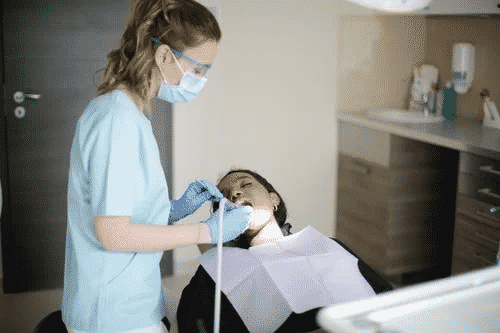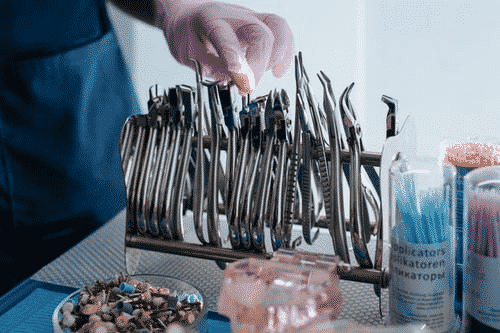How to Become a Dental Hygienist
The dental hygienist profession is a significant one focusing mainly on disease prevention and oral health promotion.
You would notice that most dental diseases have solutions and dental hygienists can help prevent such conditions.
Do you also want to know how to become a dental hygienist so that you can help people with their dental issues? If so, you would need efficient knowledge of how to become one.
The profession of a dental hygienist is a promising and well-rewarding career in the dental career field.
The dental market continues to grow, emphasizing the increasing importance and demand for dental hygienists and other dental professionals.
Let’s have a closer look at the specific requirements, steps, and processes for becoming a dental hygienist, entering this profession, and qualifying for the position.
Dental Hygienist- The Responsibilities
Dental hygienists provide optimal care for patient’s oral health by carrying out different inspections and cleaning procedures.
When needed, dentists should assist patients in maintaining good oral health by educating them on proper oral hygiene.

Becoming a dental hygienist requires completing an accredited dental hygiene program, which can be an associate degree, and obtaining state licensure. An associate degree in dental hygiene is typically required for entry-level positions. A bachelor’s or master’s degree may be necessary for advanced roles such as research, teaching, or clinical practice in public or school health programs.
Patience, detail orientation, positivity, and strong interpersonal and decision-making skills are also essential as your duties require you to stand for prolonged hours.
As a dental hygienist, your responsibilities include
- Plaque, tartar, and stain removal from a patient’s tooth by cleaning
- Perform dental X-rays
- Assist a dentist as needed
- Administer local anesthetics before their procedures
- Apply fluorides and sealants on teeth
- Documentation of overall treatment
- Educate patients on oral hygiene
- Use a variety of tools to perform their duties
Choosing A Dental Hygiene School
If you want to become a dental hygienist, you have to look for a school that offers proper programs for the profession.
- It should employ quality instructors, be properly accredited, and offer hands-on, informative classes and curriculum.
- Furthermore, you should also check if the school you are selecting fits into your budget. You can go to the school’s fees section and check the tuition and fees required. You can compare the fees of different schools and choose the one that fulfills your requirements.
- The programs should be sufficient to allow you to prepare effectively for the licensure exams, which are critical to becoming a dental hygienist.
CODA Standards for Dental Hygiene Programs
To become a dental hygienist, you should also adhere to the CODA (Commission on Dental Accreditation) standards of interest for hygienic dental programs.
The Commission on Dental Accreditation (CODA) is the sole agency approved by the United States Department of Education to accredit dental and dental-related education programs at the post-secondary level.
Let’s get an overview of some CODA standards for dental hygiene education programs to help you understand.
It will allow you to understand what you should be able to do along with your dental studies.
- The ability to adequately collect patient data for the identification of oral or physical health status
- Provide patient-based treatment and evidence-based optimal care to minimize oral health risks.
- Competent in communication and interpersonal skills to interact with diverse patients
- Competent in different problem-solving strategies to manage and help patients with their dental problems
Knowing these standards will allow you to become a better dental hygienist. You can enhance the skills mentioned in the points mentioned above along with your dental studies.
Choosing a Dental Hygiene Program
An appropriate dental hygiene program can ensure candidates become prospective dental hygienists by selecting an accredited school. Consider these before choosing a dental hygienist program:

DH Degrees Types
An Associate Degree in Dental Hygiene is the minimum educational requirement for becoming a licensed dental hygienist. Bachelor’s and Master’s degrees in dental hygiene offer more advanced education and can open doors to further career opportunities. The duration to complete your education depends on your choice- from 2 to 4 years.
Associate In DH.
The Associate’s degree, as we have discussed, is the minimum must-have qualification for licensing earned at community colleges or technical schools, taking about two years to obtain.
It covers both classroom coursework outlined by CODA and supervised clinical experience. In the first year, you spend 8 and 12 hours on hands-on practice per week, increasing up to 12 to 16 hours of dental hygiene practice in the second year.
The Requirements
Admission to any dental hygiene program requires the completion of prerequisites with a GPA of 2.5 or higher, including subjects like Anatomy, Biology, Chemistry, Sociology, etc.
Bachelor In DH.
This degree is specified for dental hygienists as a more specialized qualification in dental hygiene, participating in supervised clinical practice. You will also be educated in liberal arts.
A bachelor’s degree, also known as a degree-completion program, is for students who have already obtained a dental hygiene license, have advanced further in the field, and have developed knowledge of theory and research.
Clinical experience is not necessary since they have hands-on experience in an associate’s program. You can complete the Bachelor’s program online in 15 to 18 months.
The Requirements
You should have obtained a GPA of 2.5 or higher. A High school graduate should have studied the subjects needed for an associate’s program. If you have already successfully obtained an associate’s degree, you should know anatomy, radiology, and dental lab materials.
Master In DH.
This is the next level of a DH degree, enabling you to work at an administrative level, conduct research, or teach.
A master’s degree in dental hygiene is the best option for higher-level roles like oral disease prevention specialists, community program directors, or dental health and education program leaders.
The program takes 1–2 years and requires the completion of a capstone project.
The Requirements
You must have a bachelor’s degree in dental hygiene or a related field that covers the prerequisites for enrolling in a Master’s program.
It includes a GPA of 3.0 or higher, a valid dental hygienist license, acceptable scores on the GRE, letters of recommendation, and a possible career statement or a current resume.
Dental Hygiene The Online Platform
If you want to become a dental hygienist and do it online, we have good news for you.
Online programs allow you to enjoy the flexibility, but you must have earlier in-person clinical experience or a descending degree in dental hygiene.
Having already completed your clinical expertise by earning your Associate’s degree, you can obtain your Bachelor’s online.
DH Licensure Requirements
The dental hygienists’ licensure requirements vary from state to state, but they have a common goal for the licensure process, which is to ensure that dentists meet professional standards and maintain patient safety.
A governing body with the outlines to modernize the state licensure process in the dental field monitors the whole process to address single encounter, procedure-based examinations.
Major Requirements
The licensing authority of the state licensure requires applicants to meet these three essential requirements regardless of the state:
- An associate’s degree in dental hygiene
- Candidates for dental hygiene licensure must pass the National Board Dental Hygiene Examination (NBDHE) and a clinical board examination specific to their state or region.
- To obtain licensure, dental hygienists must pass a clinical examination administered by a state or regional testing agency approved by the state’s Board of Dentistry.
Limitations
The state Board of Dentistry monitors dentistry practice within the state. The state legislature limits the board’s authority, which includes:
- Establishment of licensure qualifications and standards for training and conduct.
- Issuance of licenses to qualified applicants.
- Declaration of rules that apply to individuals who practice in this profession.
- Taking disciplinary action for misconduct on the job.
The Accreditation
Apart from your degree in dental hygiene, you need to attend a program approved by the Commission on Dental Accreditation (CODA) to become a licensed hygienist.
Accredited dental hygiene programs ensure you are eligible as per the quality standards for future patient safety and education.
DH License Renewal
Dental hygienists must renew their licenses according to the regulations set by their state’s board of dentistry, which typically involves completing continuing education requirements and paying a renewal fee.
Benefits
Dental Hygienists enjoy other perks and benefits in addition to their fat paychecks and flexible schedules. Half of them work part-time while still earning above-average salaries.
Dental hygienists can pursue additional training in education, business administration, marketing, and public health, which help them find more specialized and high-level roles while increasing their earning potential.
FAQs
How much does a dental hygienist school cost?
The cost that you would incur in getting into a dental hygienist school depends on the program and school that you are choosing.
The cost of obtaining an associate degree in dental hygiene can vary widely depending on the institution. Prospective students should consult specific schools for current tuition rates.
If you undertake the baccalaureate degree, then its estimated total cost is $36,382. The master’s degree is $30,421.
What’s the difference between a dental assistant and a dental hygienist?
Dental hygienists focus on clinical patient care including cleaning teeth, examining patients for signs of oral diseases, and providing other preventive dental care, while dental assistants perform a variety of tasks that can include helping with patient care in addition to administrative duties like scheduling appointments and managing records.
Based on salaries, dental hygienists earn more than dental assistants.
What’s the average salary of dental hygienists?
As per the US Bureau of Labor Statistics (BLS), the salary of a dental hygienist depends on different factors such as position, education, experience, and work setting.
The average salary of dental hygienists in the USA in 2022 was approximately $81,400.
Conclusion:
We have mentioned most of the significant factors regarding how to become a dental hygienist.
We hope that this article allows you to get all the basic information and you can get going in the dental hygienist profession.
Dental Grants by State
See Also
Grants for Dental Assistant School
Does Medicaid Cover Dental Implants
Dental Grants for Low-Income Adults